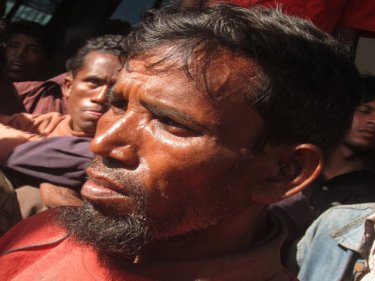PHUKET: A compact between Thailand and neighboring countries is keeping treatment of Rohingya boatpeople secret as details are emerging of their continued imprisonment in India, on the Andaman and Nicobar Islands.
About 400 boatpeople remain in detention on the isolated islands in the middle of the Indian Ocean more than three years on from Thailand's notorious ''pushbacks,'' says a new investigation.
''Abandoned by both Burma (Myanmar) and Bangladesh, their fate hangs in balance, with an indecisive government policy and the sluggish pace of repatriation,'' writes journalist Zubair Ahmed in the 'Light of Andamans' online magazine.
Fishermen from Thailand, Burma and Bangladesh caught off the Andaman and Nicobar islands will be repatriated, a local police officer said. But the Rohingya are stateless so nobody wants them back, and there is nowhere for them to go.
Phuketwan has recently confirmed that Burma's policy of the slow but steady ethnic cleansing of the Rohingya remains in place despite hope in the West that repression in the dictatorship will cease as it embraces democracy.
A small number of Rohingya who have been granted the right to live and work on Phuket have recently been denied passports by the new ''democratic'' government of Burma despite their birth there, and in some cases despite having parents and grandparents who were raised as Burmese.
Around the region, a blanket of secrecy has been thrown over the apprehension of Rohingya boatpeople, obscuring both their treatment in captivity and their future.
Vice Admiral Thavatorn Thinsuwan, Commander of Royal Thai Navy 3, which patrols Thailand's Andaman coast from bases on Phuket and Phang Nga, acknowledged this week that Thailand was working with Singapore, Malaysia and Indonesia to ward off piracy with regular air patrols.
But he was less ready to say what the compact between the countries meant for the Rohingya boatpeople, whose vessels would be more easily spotted in aerial surveys than by navy patrols in the Andaman Sea.
While Burma is becoming more open and seemingly democratic, its most abhorrent policy - the denial of citizenship and rights to the Rohingya - remains in place and is being given tacit support by a conspiracy of silence among the governments of the region.
When Phuketwan journalists, working with the South China Morning Post newspaper, in January 2009 exposed the covert ''pushbacks'' that were the then Thai government's response to growing numbers of Rohingya boatpeople, we thought the secrecy would come to an end.
After a period of openness during which Rohingya boatpeople in Thailand were treated as other illegal detainees are treated, the policy surrounding the would-be refugees - among the world's most oppressed people - has become secret again.
Because Burma point-blank refuses to grant citizenship to the Muslim Rohingya - despite their centuries of history there - those who flee can never go home.
Neighboring countries are adopting the only practical solution left to them: a covert back-door policy that basically involves tacitly supporting the handling of boatpeople by people traffickers.
Vice Admiral Taratorn was reticent to go into details when he talked to journalists on Phuket this week but he did say that the Navy and Thailand upheld UN principles of human rights.
That wasn't the case in 2009, when the reprensible ''pushbacks'' by other branches of the Thai military led to the deaths of hundreds of boatpeople and aroused concern around the region and the world.
Now for the first time, Zubair Ahmed has reported on the fate of the survivors, who remain trapped in the Andaman and Nicobar islands with no obvious hope of being returned to their homes in Burma or Bangladesh.
One survivor, Ghulam Kadir, 25, told Ahmed: ''Its three years now, and we have not done anything wrong. We were first persecuted by the Burmese Junta, pushed by the Thais into the face of death.
''The Indian government has been very sympathetic to us, but how can we continue to remain in a detention camp like this?''
Indian Navy senior officers have been engaged in talks with their peers in Thailand but when it comes to the Rohingya, no questions are being answered.
Ahmed says 422 boatpeople continue to ''languish'' in three dormitories in a centre known as the Distress Camp. About 270 have been repatriated - but not those who are bold enough to declare they are Rohingya.
Of the detainees, Ahmed writes: ''They all look well-fed and clothed. However, they are unable to accept their fate, of living as prisoners without any hope.''
Boatpeople who have been apprehended in Thailand in recent times - including the occupants of a ricketty vessel that landed on the international holiday island of Phuket last year - have simply vanished. The suspicion is that they have been passed on to smugglers.
Non-government organisations say that despite the covert nature of the process, their sense is that the Rohingya who come ashore in Thailand are not being mistreated and are simply being ''helped on,'' often to Muslim-majority Malaysia.
Efforts have been made, though, to stop the boats leaving northern Burma or neighboring Bangladesh, where many Rohingya live unsettled lives in refugee camps.
Aid workers say that although there was once intense interest, especially among European Governments, in the fate of the Rohingya, that interest has tapered off with the apparent ''Burma spring'' of voluntary reforms.
Yet while the world openly ermbraces the new Burma, the policy of ethnically cleanising the country of its resident Muslims remain unchanged.
So does the abject hopelessness of the Rohingya people.





someone need to pay, and Thailand doesn't seems to give out some free money! if someone want to take care of some Rohingyas sure, but pay from your own pocket then!
Posted by Jk on February 24, 2012 16:45